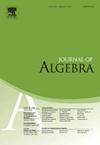论原子性对单复数代数的提升
IF 0.8
2区 数学
Q2 MATHEMATICS
引用次数: 0
摘要
如果每个非可逆元素都因数化为不可还原元素(也称为原子),那么一个交换可取消单元就是原子的;如果一个积分域的乘法单元是原子的,那么这个积分域就是原子的。早在八十年代,吉尔默就提出过这样一个问题:一个无扭单元 M 和一个积分域 R 都是原子的,这是否意味着 M 在 R 上的单元代数 R[M] 也是原子的?一般来说,这是不正确的。罗伊特曼在 1993 年给出了这个问题的第一个否定答案:他构造了一个原子积分域,其多项式扩展不是原子的。最近,Coykendall 和第一作者构造了有限秩无扭原子单体,其在某些有限域上的单体代数不是原子的。不过,从有限秩无扭单体到它们在特征为零的域上的相应单体代数的原子性上升,仍然是一个悬而未决的问题。Coykendall 和第一作者还构造了一个无穷级无扭原子单体,它的单体代数(在任意积分域上)不是原子的。作为本文的主要成果,我们构建了一个秩一的无扭原子单体,其单体代数(在任意积分域上)不是原子的。为此,我们在秩一无扭单元类中引入并研究了一种方法论构造,我们称之为提升,即把给定的单元嵌入到另一个单元中,从算术的角度来看,这通常更容易实现。例如,我们在这里证明了提升构造中的嵌入保留了主理想的升链条件和最大公有除数的存在。本文章由计算机程序翻译,如有差异,请以英文原文为准。
On the ascent of atomicity to monoid algebras
A commutative cancellative monoid is atomic if every non-invertible element factors into irreducibles (also called atoms), while an integral domain is atomic if its multiplicative monoid is atomic. Back in the eighties, Gilmer posed the question of whether the fact that a torsion-free monoid M and an integral domain R are both atomic implies that the monoid algebra of M over R is also atomic. In general this is not true, and the first negative answer to this question was given by Roitman in 1993: he constructed an atomic integral domain whose polynomial extension is not atomic. More recently, Coykendall and the first author constructed finite-rank torsion-free atomic monoids whose monoid algebras over certain finite fields are not atomic. Still, the ascent of atomicity from finite-rank torsion-free monoids to their corresponding monoid algebras over fields of characteristic zero is an open problem. Coykendall and the first author also constructed an infinite-rank torsion-free atomic monoid whose monoid algebras (over any integral domain) are not atomic. As the primary result of this paper, we construct a rank-one torsion-free atomic monoid whose monoid algebras (over any integral domain) are not atomic. To do so, we introduce and study a methodological construction inside the class of rank-one torsion-free monoids that we call lifting, which consists in embedding a given monoid into another monoid that is often more tractable from the arithmetic viewpoint. For instance, we prove here that the embedding in the lifting construction preserves the ascending chain condition on principal ideals and the existence of maximal common divisors.
求助全文
通过发布文献求助,成功后即可免费获取论文全文。
去求助
来源期刊

Journal of Algebra
数学-数学
CiteScore
1.50
自引率
22.20%
发文量
414
审稿时长
2-4 weeks
期刊介绍:
The Journal of Algebra is a leading international journal and publishes papers that demonstrate high quality research results in algebra and related computational aspects. Only the very best and most interesting papers are to be considered for publication in the journal. With this in mind, it is important that the contribution offer a substantial result that will have a lasting effect upon the field. The journal also seeks work that presents innovative techniques that offer promising results for future research.
 求助内容:
求助内容: 应助结果提醒方式:
应助结果提醒方式:


